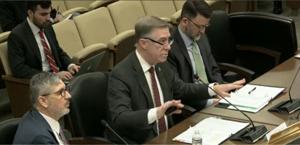(The Center Square) – Director of National Intelligence Tulsi Gabbard has declassified a document from the Biden administration showing that the federal government used taxpayer dollars to collaborate with foreign and private entities to counter what it called domestic terrorism activity.
The document, distributed in the wake of the sometimes violent Jan. 6 protests at the U.S. capitol, called for “improve[d] information sharing across all levels within, as well as outside, the Federal Government,” including with private sector and foreign partners, to “combat online disinformation” and domestic terrorism narratives.
The declassified document also laid out plans to develop and channel funding toward “digital literacy programs … to foster resiliency to disinformation,” calling on federal agencies and technology companies to mutually share information relating to what it characterized as online disinformation and “radicalization” activities.
Multiple investigations throughout 2022 and 2023 revealed that the federal government indeed took a whole-of-government approach to censor Americans posting information the Biden Administration deemed false or harmful online, as The Center Square reported.
The United States Agency for International Development and the departments of Homeland Security, State, and Education were among the agencies tasked to carry out the plans.
Republicans, along with conservative groups like America First Legal, which requested the information, say the blueprint showcases the “weaponization” of the intelligence community under the previous presidency.
“Until yesterday, the Biden Administration’s ‘Plan for Countering Domestic Terrorism’ was classified,” Sen. Eric Schmitt, R-Mo., said on X. “Now, thanks to @DNIGabbard, it’s public. It’s a roadmap for left-wing ideological warfare.”
During the Biden administration, the Department of Homeland Security provided at least $90 million taxpayer dollars to state, local, and tribal governments through the Targeted Violence and Terrorism Prevention Grant Program.
Gabbard released the documents the same day Secretary of State Marco Rubio announced the closure of the State Department’s Counter Foreign Information Manipulation and Interference.
“Under the previous administration, this office, which cost taxpayers more than $50 million per year, spent millions of dollars to actively silence and censor the voices of Americans they were supposed to be serving,” Rubio said in a news release. “This is antithetical to the very principles we should be upholding and inconceivable it was taking place in America.”





















































